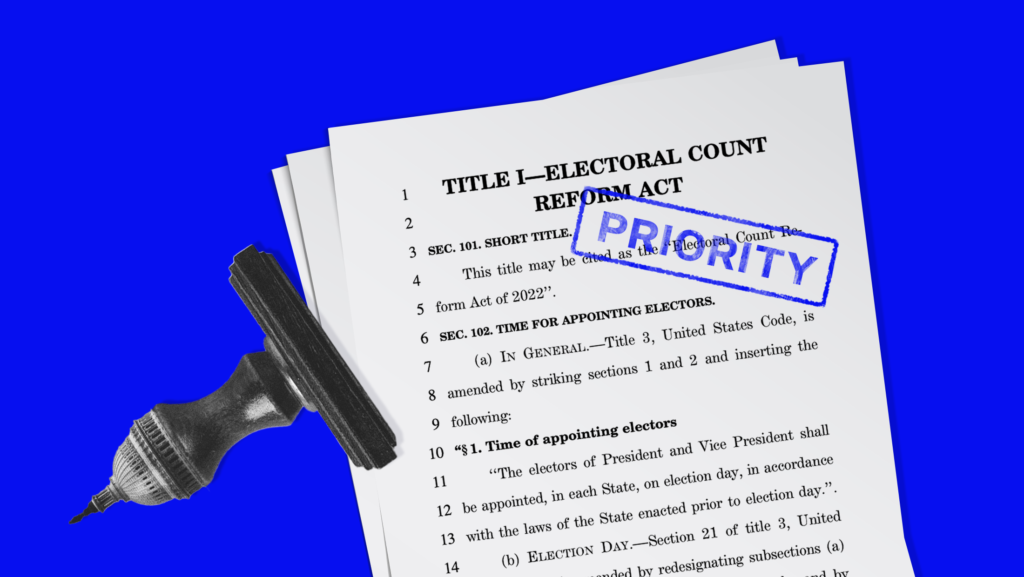It Is Time to Reform the Electoral Count Act

With the midterms behind us, Democrats in Congress face a rush of last-minute legislation to consider in the current lame duck session. None is as important as the Electoral Count Reform Act (ECRA), which I’m thrilled was included in Congress’ omnibus spending bill. While it is limited in its scope and fails to address many other threats to our election systems, namely voter suppression, the ECRA will nevertheless strengthen our democracy in advance of the 2024 presidential election.
It is no secret that I have long been skeptical of efforts to reform the Electoral Count Act of 1887 (ECA) — the archaic law that sets the rules for how presidential electors are certified and counted by Congress. After the attack on the U.S. Capitol on Jan. 6, 2021, reforming the ECA became a top priority in preventing another election subversion event in the future. Traditionally, the Jan. 6 following a presidential election is merely a ceremonial affair: States send their Electoral College votes to Congress for the vice president and both chambers of Congress to certify. In the aftermath of 2020, the failed one-term President Donald Trump and his supporters exploited the vulnerabilities of the ECA to fuel Trump’s attempts to overturn the election results and pressure then-Vice President Mike Pence to reject valid votes. While the ECA should have been updated years ago, the attack on the Capitol in 2021 prompted a more urgent campaign to reform this antiquated law, resulting in a bipartisan bill introduced in July 2022.
Originally, I opposed the passage of this new bill, which was championed by a group of 16 U.S. senators, because I believed it risked doing more harm than good. As I wrote this past July, the ECA reform bill “in its current form…is not ready for enactment. Lacking precision in critical areas, the bill feels less like the product of legislative compromise and more like something constructed in a law school faculty lounge. And it is impractical in ways that practicing lawyers would recognize, but Washington think tanks might ignore.”
That was before Sen. Amy Klobuchar (D-Minn.) took charge and made significant improvements to the bill. She did this, first and foremost, by listening to and engaging with not just professors, but practitioners as well. The result was a bipartisan bill introduced in September that vastly improved the prior text released by Sens. Susan Collins (R-Maine) and Joe Manchin (D-W.Va.) in July.
I am thrilled to now support the ECRA and urge both chambers of Congress to pass it as soon as possible.
As I previously noted, the July version could have been read to severely limit the ability of courts to overturn a false certification by a partisan governor. Luckily, in this year’s midterm elections, most election denier candidates for governor lost. But these defeats are no guarantee in the future. Thankfully, the current text makes clear that a governor’s determination of who won their state’s election is subject to broad judicial review.
Second, the previous version of the bill placed too much emphasis on the role of federal courts, virtually excluding state courts. As we have seen this year — in states like Georgia, New York, Pennsylvania and Wisconsin — state courts play a significant role in protecting voting rights, which is exactly why Republicans have repeatedly attacked this form of judicial oversight. The ECRA needed to directly reflect the importance of state court review in election disputes. Once again, the current bill does just that.
Finally, the prior text provided a federal court process whereby cases would be heard by a three-judge panel and then, if appealed, automatically reviewed by the U.S. Supreme Court. I previously noted that, in 2020, the Supreme Court wisely chose not to accept for review a single case brought by Trump or his allies. Klobuchar heard those concerns and improved the text so that future Supreme Court review would be discretionary, rather than automatic.
To some, these changes may seem small. But, in practice, these changes make a big difference. In fact, it is often those seemingly minor details that have ripple effects, especially in our elections. We saw this earlier this month ahead of the Georgia U.S. Senate runoff when a particular interpretation of one provision of the state’s voter suppression law resulted in more than 70,000 Georgians casting their ballots on the Saturday after Thanksgiving.
Likewise, we are seeing the right-wing invest millions of dollars into promoting the so-called independent state legislature theory because the role of state court review of state election laws often means the difference between fair maps and partisan gerrymanders. This theory, if adopted by the Supreme Court in the case Moore v. Harper, would — at its extreme — block state courts from being able to interpret and apply their own state constitutions when resolving congressional redistricting disputes and reviewing voter suppression laws, and instead give that authority over to the federal judiciary. While we won’t know the Court’s final decision until next year, The revised version of the ECRA places much-needed emphasis on state courts and the role they play in our elections.
Although my support of the ECRA was not a given, Senate Democrats worked tirelessly to improve a bill so that all progressives can see it as a bill worth passing. I am thrilled to now support the ECRA and urge both chambers of Congress to pass it as soon as possible.